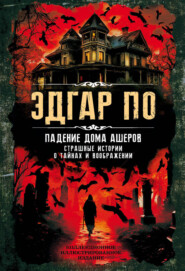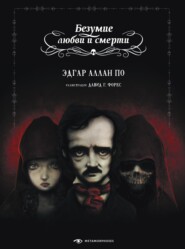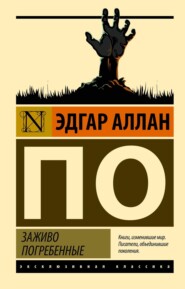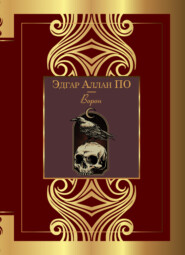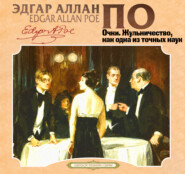По всем вопросам обращайтесь на: info@litportal.ru
(©) 2003-2024.
✖
The Works of Edgar Allan Poe – Volume 5
Настройки чтения
Размер шрифта
Высота строк
Поля
Charles Goodfellow, Esq., Rattleborough
From H.F.B. & Co.
Chat. Mar. A – No. 1. – 6 doz. bottles (1/2 Gross)
“Charles Goodfellow, Esquire.
“Dear Sir – In conformity with an order transmitted to our firm about two months since, by our esteemed correspondent, Mr. Barnabus
Shuttleworthy, we have the honor of forwarding this morning, to your address, a double box of Chateau-Margaux of the antelope brand, violet seal. Box numbered and marked as per margin.
“We remain, sir,
“Your most ob’nt ser’ts,
“HOGGS, FROGS, BOGS, & CO.
“City of – , June 21, 18 – .
“P.S. – The box will reach you by wagon, on the day after your receipt of this letter. Our respects to Mr. Shuttleworthy.
“H., F., B., & CO.”
The fact is, that Mr. Goodfellow had, since the death of Mr. Shuttleworthy, given over all expectation of ever receiving the promised Chateau-Margaux; and he, therefore, looked upon it now as a sort of especial dispensation of Providence in his behalf. He was highly delighted, of course, and in the exuberance of his joy invited a large party of friends to a petit souper on the morrow, for the purpose of broaching the good old Mr. Shuttleworthy’s present. Not that he said any thing about “the good old Mr. Shuttleworthy” when he issued the invitations. The fact is, he thought much and concluded to say nothing at all. He did not mention to any one – if I remember aright – that he had received a present of Chateau-Margaux. He merely asked his friends to come and help him drink some, of a remarkable fine quality and rich flavour, that he had ordered up from the city a couple of months ago, and of which he would be in the receipt upon the morrow. I have often puzzled myself to imagine why it was that “Old Charley” came to the conclusion to say nothing about having received the wine from his old friend, but I could never precisely understand his reason for the silence, although he had some excellent and very magnanimous reason, no doubt.
The morrow at length arrived, and with it a very large and highly respectable company at Mr. Goodfellow’s house. Indeed, half the borough was there, – I myself among the number, – but, much to the vexation of the host, the Chateau-Margaux did not arrive until a late hour, and when the sumptuous supper supplied by “Old Charley” had been done very ample justice by the guests. It came at length, however, – a monstrously big box of it there was, too – and as the whole party were in excessively good humor, it was decided, nem. con., that it should be lifted upon the table and its contents disembowelled forthwith.
No sooner said than done. I lent a helping hand; and, in a trice we had the box upon the table, in the midst of all the bottles and glasses, not a few of which were demolished in the scuffle. “Old Charley,” who was pretty much intoxicated, and excessively red in the face, now took a seat, with an air of mock dignity, at the head of the board, and thumped furiously upon it with a decanter, calling upon the company to keep order “during the ceremony of disinterring the treasure.”
After some vociferation, quiet was at length fully restored, and, as very often happens in similar cases, a profound and remarkable silence ensued. Being then requested to force open the lid, I complied, of course, “with an infinite deal of pleasure.” I inserted a chisel, and giving it a few slight taps with a hammer, the top of the box flew suddenly off, and at the same instant, there sprang up into a sitting position, directly facing the host, the bruised, bloody, and nearly putrid corpse of the murdered Mr. Shuttleworthy himself. It gazed for a few seconds, fixedly and sorrowfully, with its decaying and lack-lustre eyes, full into the countenance of Mr. Goodfellow; uttered slowly, but clearly and impressively, the words – “Thou art the man!” and then, falling over the side of the chest as if thoroughly satisfied, stretched out its limbs quiveringly upon the table.
The scene that ensued is altogether beyond description. The rush for the doors and windows was terrific, and many of the most robust men in the room fainted outright through sheer horror. But after the first wild, shrieking burst of affright, all eyes were directed to Mr. Goodfellow. If I live a thousand years, I can never forget the more than mortal agony which was depicted in that ghastly face of his, so lately rubicund with triumph and wine. For several minutes he sat rigidly as a statue of marble; his eyes seeming, in the intense vacancy of their gaze, to be turned inward and absorbed in the contemplation of his own miserable, murderous soul. At length their expression appeared to flash suddenly out into the external world, when, with a quick leap, he sprang from his chair, and falling heavily with his head and shoulders upon the table, and in contact with the corpse, poured out rapidly and vehemently a detailed confession of the hideous crime for which Mr. Pennifeather was then imprisoned and doomed to die.
What he recounted was in substance this: – He followed his victim to the vicinity of the pool; there shot his horse with a pistol; despatched its rider with the butt end; possessed himself of the pocket-book, and, supposing the horse dead, dragged it with great labour to the brambles by the pond. Upon his own beast he slung the corpse of Mr. Shuttleworthy, and thus bore it to a secure place of concealment a long distance off through the woods.
The waistcoat, the knife, the pocket-book, and bullet, had been placed by himself where found, with the view of avenging himself upon Mr. Pennifeather. He had also contrived the discovery of the stained handkerchief and shirt.
Towards the end of the blood-churning recital the words of the guilty wretch faltered and grew hollow. When the record was finally exhausted, he arose, staggered backward from the table, and fell-dead.
The means by which this happily-timed confession was extorted, although efficient, were simple indeed. Mr. Goodfellow’s excess of frankness had disgusted me, and excited my suspicions from the first. I was present when Mr. Pennifeather had struck him, and the fiendish expression which then arose upon his countenance, although momentary, assured me that his threat of vengeance would, if possible, be rigidly fulfilled. I was thus prepared to view the manoeuvering of “Old Charley” in a very different light from that in which it was regarded by the good citizens of Rattleborough. I saw at once that all the criminating discoveries arose, either directly or indirectly, from himself. But the fact which clearly opened my eyes to the true state of the case, was the affair of the bullet, found by Mr. G. in the carcass of the horse. I had not forgotten, although the Rattleburghers had, that there was a hole where the ball had entered the horse, and another where it went out. If it were found in the animal then, after having made its exit, I saw clearly that it must have been deposited by the person who found it. The bloody shirt and handkerchief confirmed the idea suggested by the bullet; for the blood on examination proved to be capital claret, and no more. When I came to think of these things, and also of the late increase of liberality and expenditure on the part of Mr. Goodfellow, I entertained a suspicion which was none the less strong because I kept it altogether to myself.
In the meantime, I instituted a rigorous private search for the corpse of Mr. Shuttleworthy, and, for good reasons, searched in quarters as divergent as possible from those to which Mr. Goodfellow conducted his party. The result was that, after some days, I came across an old dry well, the mouth of which was nearly hidden by brambles; and here, at the bottom, I discovered what I sought.
Now it so happened that I had overheard the colloquy between the two cronies, when Mr. Goodfellow had contrived to cajole his host into the promise of a box of Chateaux-Margaux. Upon this hint I acted. I procured a stiff piece of whalebone, thrust it down the throat of the corpse, and deposited the latter in an old wine box-taking care so to double the body up as to double the whalebone with it. In this manner I had to press forcibly upon the lid to keep it down while I secured it with nails; and I anticipated, of course, that as soon as these latter were removed, the top would fly off and the body up.
Having thus arranged the box, I marked, numbered, and addressed it as already told; and then writing a letter in the name of the wine merchants with whom Mr. Shuttleworthy dealt, I gave instructions to my servant to wheel the box to Mr. Goodfellow’s door, in a barrow, at a given signal from myself. For the words which I intended the corpse to speak, I confidently depended upon my ventriloquial abilities; for their effect, I counted upon the conscience of the murderous wretch.
I believe there is nothing more to be explained. Mr. Pennifeather was released upon the spot, inherited the fortune of his uncle, profited by the lessons of experience, turned over a new leaf, and led happily ever afterward a new life.
WHY THE LITTLE FRENCHMAN WEARS HIS HAND IN A SLING
IT’S on my visiting cards sure enough (and it’s them that’s all o’ pink satin paper) that inny gintleman that plases may behould the intheristhin words, “Sir Pathrick O’Grandison, Barronitt, 39 Southampton Row, Russell Square, Parrish o’ Bloomsbury.” And shud ye be wantin’ to diskiver who is the pink of purliteness quite, and the laider of the hot tun in the houl city o’ Lonon – why it’s jist mesilf. And fait that same is no wonder at all at all (so be plased to stop curlin your nose), for every inch o’ the six wakes that I’ve been a gintleman, and left aff wid the bogthrothing to take up wid the Barronissy, it’s Pathrick that’s been living like a houly imperor, and gitting the iddication and the graces. Och! and wouldn’t it be a blessed thing for your spirrits if ye cud lay your two peepers jist, upon Sir Pathrick O’Grandison, Barronitt, when he is all riddy drissed for the hopperer, or stipping into the Brisky for the drive into the Hyde Park. But it’s the illigant big figgur that I ave, for the rason o’ which all the ladies fall in love wid me. Isn’t it my own swate silf now that’ll missure the six fut, and the three inches more nor that, in me stockins, and that am excadingly will proportioned all over to match? And it is ralelly more than three fut and a bit that there is, inny how, of the little ould furrener Frinchman that lives jist over the way, and that’s a oggling and a goggling the houl day, (and bad luck to him,) at the purty widdy Misthress Tracle that’s my own nixt-door neighbor, (God bliss her!) and a most particuller frind and acquaintance? You percave the little spalpeen is summat down in the mouth, and wears his lift hand in a sling, and it’s for that same thing, by yur lave, that I’m going to give you the good rason.
The truth of the houl matter is jist simple enough; for the very first day that I com’d from Connaught, and showd my swate little silf in the strait to the widdy, who was looking through the windy, it was a gone case althegither with the heart o’ the purty Misthress Tracle. I percaved it, ye see, all at once, and no mistake, and that’s God’s truth. First of all it was up wid the windy in a jiffy, and thin she threw open her two peepers to the itmost, and thin it was a little gould spy-glass that she clapped tight to one o’ them and divil may burn me if it didn’t spake to me as plain as a peeper cud spake, and says it, through the spy-glass: “Och! the tip o’ the mornin’ to ye, Sir Pathrick O’Grandison, Barronitt, mavourneen; and it’s a nate gintleman that ye are, sure enough, and it’s mesilf and me forten jist that’ll be at yur sarvice, dear, inny time o’ day at all at all for the asking.” And it’s not mesilf ye wud have to be bate in the purliteness; so I made her a bow that wud ha’ broken yur heart altegither to behould, and thin I pulled aff me hat with a flourish, and thin I winked at her hard wid both eyes, as much as to say, “True for you, yer a swate little crature, Mrs. Tracle, me darlint, and I wish I may be drownthed dead in a bog, if it’s not mesilf, Sir Pathrick O’Grandison, Barronitt, that’ll make a houl bushel o’ love to yur leddyship, in the twinkling o’ the eye of a Londonderry purraty.”
And it was the nixt mornin’, sure, jist as I was making up me mind whither it wouldn’t be the purlite thing to sind a bit o’ writin’ to the widdy by way of a love-litter, when up com’d the delivery servant wid an illigant card, and he tould me that the name on it (for I niver could rade the copperplate printin on account of being lift handed) was all about Mounseer, the Count, A Goose, Look – aisy, Maiter-di-dauns, and that the houl of the divilish lingo was the spalpeeny long name of the little ould furrener Frinchman as lived over the way.
And jist wid that in cum’d the little willian himself, and then he made me a broth of a bow, and thin he said he had ounly taken the liberty of doing me the honor of the giving me a call, and thin he went on to palaver at a great rate, and divil the bit did I comprehind what he wud be afther the tilling me at all at all, excipting and saving that he said “pully wou, woolly wou,” and tould me, among a bushel o’ lies, bad luck to him, that he was mad for the love o’ my widdy Misthress Tracle, and that my widdy Mrs. Tracle had a puncheon for him.
At the hearin’ of this, ye may swear, though, I was as mad as a grasshopper, but I remimbered that I was Sir Pathrick O’Grandison, Barronitt, and that it wasn’t althegither gentaal to lit the anger git the upper hand o’ the purliteness, so I made light o’ the matter and kipt dark, and got quite sociable wid the little chap, and afther a while what did he do but ask me to go wid him to the widdy’s, saying he wud give me the feshionable inthroduction to her leddyship.
“Is it there ye are?” said I thin to mesilf, “and it’s thrue for you, Pathrick, that ye’re the fortunittest mortal in life. We’ll soon see now whither it’s your swate silf, or whither it’s little Mounseer Maiter-di-dauns, that Misthress Tracle is head and ears in the love wid.”
Wid that we wint aff to the widdy’s, next door, and ye may well say it was an illigant place; so it was. There was a carpet all over the floor, and in one corner there was a forty-pinny and a Jew’s harp and the divil knows what ilse, and in another corner was a sofy, the beautifullest thing in all natur, and sitting on the sofy, sure enough, there was the swate little angel, Misthress Tracle.
“The tip o’ the mornin’ to ye,” says I, “Mrs. Tracle,” and thin I made sich an illigant obaysance that it wud ha quite althegither bewildered the brain o’ ye.
“Wully woo, pully woo, plump in the mud,” says the little furrenner Frinchman, “and sure Mrs. Tracle,” says he, that he did, “isn’t this gintleman here jist his reverence Sir Pathrick O’Grandison, Barronitt, and isn’t he althegither and entirely the most particular frind and acquaintance that I have in the houl world?”
And wid that the widdy, she gits up from the sofy, and makes the swatest curthchy nor iver was seen; and thin down she sits like an angel; and thin, by the powers, it was that little spalpeen Mounseer Maiter-di-dauns that plumped his silf right down by the right side of her. Och hon! I ixpicted the two eyes o’ me wud ha cum’d out of my head on the spot, I was so dispirate mad! Howiver, “Bait who!” says I, after awhile. “Is it there ye are, Mounseer Maiter-di-dauns?” and so down I plumped on the lift side of her leddyship, to be aven with the willain. Botheration! it wud ha done your heart good to percave the illigant double wink that I gived her jist thin right in the face with both eyes.
But the little ould Frinchman he niver beginned to suspict me at all at all, and disperate hard it was he made the love to her leddyship. “Woully wou,” says he, “Pully wou,” says he, “Plump in the mud,” says he.
“That’s all to no use, Mounseer Frog, mavourneen,” thinks I; and I talked as hard and as fast as I could all the while, and throth it was mesilf jist that divarted her leddyship complately and intirely, by rason of the illigant conversation that I kipt up wid her all about the dear bogs of Connaught. And by and by she gived me such a swate smile, from one ind of her mouth to the ither, that it made me as bould as a pig, and I jist took hould of the ind of her little finger in the most dillikitest manner in natur, looking at her all the while out o’ the whites of my eyes.
And then ounly percave the cuteness of the swate angel, for no sooner did she obsarve that I was afther the squazing of her flipper, than she up wid it in a jiffy, and put it away behind her back, jist as much as to say, “Now thin, Sir Pathrick O’Grandison, there’s a bitther chance for ye, mavourneen, for it’s not altogether the gentaal thing to be afther the squazing of my flipper right full in the sight of that little furrenner Frinchman, Mounseer Maiter-di-dauns.”
Wid that I giv’d her a big wink jist to say, “lit Sir Pathrick alone for the likes o’ them thricks,” and thin I wint aisy to work, and you’d have died wid the divarsion to behould how cliverly I slipped my right arm betwane the back o’ the sofy, and the back of her leddyship, and there, sure enough, I found a swate little flipper all a waiting to say, “the tip o’ the mornin’ to ye, Sir Pathrick O’Grandison, Barronitt.” And wasn’t it mesilf, sure, that jist giv’d it the laste little bit of a squaze in the world, all in the way of a commincement, and not to be too rough wid her leddyship? and och, botheration, wasn’t it the gentaalest and dilikittest of all the little squazes that I got in return? “Blood and thunder, Sir Pathrick, mavourneen,” thinks I to mesilf, “fait it’s jist the mother’s son of you, and nobody else at all at all, that’s the handsomest and the fortunittest young bog-throtter that ever cum’d out of Connaught!” And with that I givd the flipper a big squaze, and a big squaze it was, by the powers, that her leddyship giv’d to me back. But it would ha split the seven sides of you wid the laffin’ to behould, jist then all at once, the consated behavior of Mounseer Maiter-di-dauns. The likes o’ sich a jabbering, and a smirking, and a parley-wouing as he begin’d wid her leddyship, niver was known before upon arth; and divil may burn me if it wasn’t me own very two peepers that cotch’d him tipping her the wink out of one eye. Och, hon! if it wasn’t mesilf thin that was mad as a Kilkenny cat I shud like to be tould who it was!
“Let me infarm you, Mounseer Maiter-di-dauns,” said I, as purlite as iver ye seed, “that it’s not the gintaal thing at all at all, and not for the likes o’ you inny how, to be afther the oggling and a goggling at her leddyship in that fashion,” and jist wid that such another squaze as it was I giv’d her flipper, all as much as to say, “isn’t it Sir Pathrick now, my jewel, that’ll be able to the proticting o’ you, my darlint?” and then there cum’d another squaze back, all by way of the answer. “Thrue for you, Sir Pathrick,” it said as plain as iver a squaze said in the world, “Thrue for you, Sir Pathrick, mavourneen, and it’s a proper nate gintleman ye are – that’s God’s truth,” and with that she opened her two beautiful peepers till I belaved they wud ha’ cum’d out of her hid althegither and intirely, and she looked first as mad as a cat at Mounseer Frog, and thin as smiling as all out o’ doors at mesilf.
“Thin,” says he, the willian, “Och hon! and a wolly-wou, pully-wou,” and then wid that he shoved up his two shoulders till the divil the bit of his hid was to be diskivered, and then he let down the two corners of his purraty-trap, and thin not a haporth more of the satisfaction could I git out o’ the spalpeen.
Belave me, my jewel, it was Sir Pathrick that was unreasonable mad thin, and the more by token that the Frinchman kipt an wid his winking at the widdy; and the widdy she kept an wid the squazing of my flipper, as much as to say, “At him again, Sir Pathrick O’Grandison, mavourneen:” so I just ripped out wid a big oath, and says I;
“Ye little spalpeeny frog of a bog-throtting son of a bloody noun!” – and jist thin what d’ye think it was that her leddyship did? Troth she jumped up from the sofy as if she was bit, and made off through the door, while I turned my head round afther her, in a complate bewilderment and botheration, and followed her wid me two peepers. You percave I had a reason of my own for knowing that she couldn’t git down the stares althegither and intirely; for I knew very well that I had hould of her hand, for the divil the bit had I iver lit it go. And says I; “Isn’t it the laste little bit of a mistake in the world that ye’ve been afther the making, yer leddyship? Come back now, that’s a darlint, and I’ll give ye yur flipper.” But aff she wint down the stairs like a shot, and thin I turned round to the little Frinch furrenner. Och hon! if it wasn’t his spalpeeny little paw that I had hould of in my own – why thin – thin it wasn’t – that’s all.
And maybe it wasn’t mesilf that jist died then outright wid the laffin’, to behold the little chap when he found out that it wasn’t the widdy at all at all that he had had hould of all the time, but only Sir Pathrick O’Grandison. The ould divil himself niver behild sich a long face as he pet an! As for Sir Pathrick O’Grandison, Barronitt, it wasn’t for the likes of his riverence to be afther the minding of a thrifle of a mistake. Ye may jist say, though (for it’s God’s thruth), that afore I left hould of the flipper of the spalpeen (which was not till afther her leddyship’s futman had kicked us both down the stairs), I giv’d it such a nate little broth of a squaze as made it all up into raspberry jam.
“Woully wou,” says he, “pully wou,” says he – “Cot tam!”
And that’s jist the thruth of the rason why he wears his lift hand in a sling.
BON-BON
Quand un bon vin meuble mon estomac,
Je suis plus savant que Balzac – Plus sage que Pibrac;
Mon brass seul faisant l’attaque






